Fundamento destacado: 1. El solicitante se queja de una violación de su derecho a la libertad de religión en virtud del Artículo 9 de la Convención. Esta disposición se lee de la siguiente manera:
“1. Todos tienen derecho a la libertad de pensamiento, conciencia y religión; este derecho incluye la libertad de cambiar su religión, creencia y libertad, ya sea solo o en la comunidad con otros y en público o privado, para manifestar su religión o creencia, en la adoración, la enseñanza, la práctica y la observancia.
2. La libertad para manifestar la religión o las creencias de uno estará sujeto solo a las limitaciones que se prescriban por la ley y son necesarias en una sociedad democrática en interés de la seguridad pública, para la protección del orden público, la salud o la moral, o para la protección de los derechos y libertades de los demás».
El gobierno demandado afirma que la presente queja está manifiestamente mal fundada. Afirman que la obligación de los no miembros de pagar el impuesto de la iglesia, es decir, el impuesto sobre el disidente, para la Iglesia de Suecia, se basó en la noción de que la Iglesia había sido confiada de ciertas tareas llevadas a cabo en interés de todos, tanto miembros como no miembros, incluida la obligación legal de proporcionar un lugar de descanso final en el entierro público para los miembros y los no miembros. Aunque la administración de entierro, sin duda, es la tarea no religiosa más costosa confía con la iglesia, también realiza otras actividades civiles en interés de la sociedad en su conjunto, entre otras cosas, el cuidado y el mantenimiento de los antiguos edificios de la iglesia y otras propiedades eclesiásticas y el cuidado de los viejos registros de la población.
Teniendo en cuenta que los edificios religiosos y la propiedad forman parte del patrimonio cultural sueco que debe preservarse para las generaciones futuras y que los registros de la población antigua son importantes para los investigadores y para el público en general, el gobierno afirma que ha sido natural exigir contribuciones financieras de los miembros y no que no sean miembros de los miembros y no que no miembros de la Iglesia de Suecia para el desempeño de esas tareas.
El gobierno afirma que el impuesto sobre disidente fue diseñado para cubrir solo las actividades civiles de las parroquias. La tasa del 25 por ciento fijada por la Ley de Impuestos del Diseño se basó en investigaciones sobre la economía de la Iglesia de Suecia. Se refieren a lo anterior Informe mencionado de la Agencia Nacional para el Desarrollo Administrativo que, señala el Gobierno, no incluía los costos incurridos para las reparaciones de los edificios de la iglesia de valor histórico.
El solicitante sostiene que su obligación de pagar impuestos a la Iglesia de Suecia ha violado su derecho a la libertad de religión. Afirma que no era necesario confiar a la administración de entierro con la Iglesia de Suecia. En cambio, esta responsabilidad debe ser otorgada a los municipios, que deben ser propietario de los terrenos de entierro y cubrir sus costos a través del impuesto municipal regular. Señala que ciertos municipios en realidad están administrando entierros y entierros. motivos, en lugar de las parroquias locales. Supuestamente, esto muestra que ya no hay tareas civiles obligatorias para que las parroquias administren. El tribunal señala que el tema en juego es si los derechos del solicitante en virtud del Artículo 9 de la Convención han sido violados debido al hecho de que tuvo que pagar un impuesto especial a la Iglesia de Suecia, aunque él no es miembro de esa iglesia. Teniendo en cuenta que el pago de un impuesto no puede caracterizarse como una «manifestación» de la religión de uno, El tribunal examinará esta queja bajo la primera extremidad del Artículo 9 § 1 que concierne al derecho general a la libertad de religión.
Este derecho general protege a todos los obligados a participar en actividades religiosas contra su voluntad sin ser miembro de la comunidad religiosa que realizan esas actividades. El pago de un impuesto específico a una iglesia para sus actividades religiosas puede, en ciertas circunstancias, ser consideradas como tal participación (ver Darby v. Sweden Sentution del 23 de octubre de 1990, Serie A no. 187, Opinión de la Comisión, p. 19, § 51). El artículo 9 de la Convención requiere que un estado respete las convicciones religiosas de aquellos que no pertenecen a la Iglesia, por ejemplo, al hacer posible que sean exentos de la obligación de hacer contribuciones a la Iglesia para sus actividades religiosas. Bajo el sistema sueco aplicado en el momento material, esto se realizó en principio a través de la Ley de Impuestos del Diseño que permitió la exención de parte del impuesto de la Iglesia (ibid., P. 20, §§ 58-59).
En el presente caso, el tribunal está de acuerdo con el gobierno en que la administración de entierros, el cuidado y mantenimiento de la propiedad de la iglesia y los edificios de valor histórico y el cuidado de los registros de la población antiguos pueden considerarse razonablemente como tareas de naturaleza no religiosa que se realizan en interés de la sociedad en su conjunto. Debe dejarse al estado decidir quién debe confiar la responsabilidad de llevar a cabo estas tareas y cómo deben financiarse. Si bien tiene la obligación de respetar el derecho del individuo a la libertad de religión, el estado tiene un amplio margen de aprecio al tomar tales decisiones.
El tribunal recuerda que el solicitante, Al no ser miembro de la Iglesia de Suecia, no tuvo que pagar el impuesto completo de la iglesia, sino solo una parte del mismo, el 25 por ciento del monto total, como impuesto sobre disidente. Como se ha observado anteriormente, la justificación detrás de la obligación de pagar el impuesto sobre el disidente era que los no miembros deberían contribuir a las actividades no religiosas de la Iglesia. La tasa impositiva reducida se determinó sobre la base de una investigación de la economía de la Iglesia de Suecia, que mostró que los costos del entierro del fallecido ascendieron a aproximadamente el 24 por ciento de los costos totales de la iglesia.
Por lo tanto, es evidente que el impuesto pagado por el solicitante a la Iglesia de Suecia fue proporcional a los costos de sus responsabilidades civiles. Por lo tanto, no se puede decir que se vio obligado a contribuir a las actividades religiosas de la Iglesia. Además,
No se puede considerar que el hecho de que la Iglesia de Suecia haya sido confiado con las tareas en cuestión no se puede considerar que viole el Artículo 9 de la Convención. A este respecto. Cabe señalar que la iglesia estaba a cargo de mantener los registros de población durante muchos años y, por lo tanto, es natural que se encargue de esos registros hasta que finalmente hayan sido transferidos a los archivos estatales. También, La administración de entierros y el mantenimiento de la propiedad antigua de la iglesia son tareas que razonablemente se pueden confiar con la iglesia establecida en el país. El Tribunal tiene en cuenta que el pago del impuesto sobre el disidente y el desempeño de las actividades civiles de la Iglesia fueron supervisados por las autoridades públicas, incluidas las autoridades fiscales y la Junta Administrativa del Condado.
Por lo tanto, el Tribunal concluye que la obligación del solicitante de pagar el impuesto sobre el disidente no contravenía su derecho a la libertad de religión en virtud del Artículo 9 de la Convención.
Se deduce que esta parte de la aplicación está manifiestamente enfermedad
fundado en el sentido del artículo 35 § 3 de la Convención.
[Traducción de LP]
1. The applicant complains of a violation of his right to freedom of religion under Article 9 of the Convention. This provision reads as follows:
“1. Everyone has the right to freedom of thought, conscience and religion; this right includes freedom to change his religion or belief and freedom, either alone or in community with others and in public or private, to manifest his religion or belief, in worship, teaching, practice and observance.
2. Freedom to manifest one’s religion or beliefs shall be subject only to such limitations as are prescribed by law and are necessary in a democratic society in the interests of public safety, for the protection of public order, health or morals, or for the protection of the rights and freedoms of others.”
The respondent Government submit that the present complaint is manifestly ill-founded. They state that the obligation of non-members to pay church tax, i.e. dissenter tax, to the Church of Sweden was based on the notion that the Church had been entrusted with certain tasks carried out in the interest of everyone – members as well as non-members – including the legal obligation to provide a final resting-place in public burial-grounds for both members and non-members. Although the burial administration no doubt is the most costly non-religious task entrusted with the Church, it also performs other civil activities in the interest of society as a whole, inter alia the care and maintenance of old church buildings and other ecclesiastical property and the care of old population records. Considering that religious buildings and property form part of the Swedish cultural heritage which should be preserved for future generations and that the old population records are of importance to researchers and to the general public, the Government submit that it has been natural to demand financial contributions from both members and non-members of the Church of Sweden for the performance of those tasks.
The Government state that the dissenter tax was designed to cover only the civil activities of the parishes. The 25 per cent rate fixed by the Dissenter Tax Act was based on investigations into the economy of the Church of Sweden. They refer to the above-mentioned report by the National Agency for Administrative Development which, the Government point out, did not include costs incurred for the repairs of church buildings of historic value.
The applicant maintains that his obligation to pay tax to the Church of Sweden has violated his right to freedom of religion. He states that it was not necessary to entrust the burial administration with the Church of Sweden. Instead, this responsibility should be given to the municipalities, which should own the burial-grounds and cover their costs through the regular municipal tax. He notes that certain municipalities are actually administering burials and burial-grounds, rather than the local parishes. Allegedly, this shows that there are no longer any obligatory civil tasks for the parishes to administer.
The Court notes that the issue at stake is whether the applicant’s rights under Article 9 of the Convention have been violated due to the fact that he had to pay a special tax to the Church of Sweden although he is not a member of that Church. Considering that the payment of a tax cannot be characterised as a “manifestation” of one’s religion, the Court will examine this complaint under the first limb of Article 9 § 1 which concerns the general right to freedom of religion.
This general right protects everyone from being compelled to be involved in religious activities against his will without being a member of the religious community carrying out those activities. The payment of a specific tax to a church for its religious activities may, in certain circumstances, be seen as such involvement (see the Darby v. Sweden judgment of 23 October 1990, Series A no. 187, opinion of the Commission, p. 19, § 51). Article 9 of the Convention requires that a State respects the religious convictions of those who do not belong to the church, for instance by making it possible for them to be exempted from the obligation to make contributions to the church for its religious activities. Under the Swedish system applied at the material time this was in principle done through the Dissenter Tax Act which allowed for exemption from part of the church tax (ibid., p. 20, §§ 58-59).
In the present case, the Court agrees with the Government that the administration of burials, the care and maintenance of church property and buildings of historic value and the care of old population records can reasonably be considered as tasks of a non-religious nature which are performed in the interest of society as a whole. It must be left to the State to decide who should be entrusted with the responsibility of carrying out these tasks and how they should be financed. While it is under an obligation to respect the individual’s right to freedom of religion, the State has a wide margin of appreciation in making such decisions.
The Court recalls that the applicant, not being a member of the Church of Sweden, did not have to pay the full church tax but only a portion thereof – 25 per cent of the full amount – as a dissenter tax. As has been noted above, the rationale behind the obligation to pay the dissenter tax was that non-members should contribute to the non-religious activities of the Church. The reduced tax rate was determined on the basis of an investigation of the economy of the Church of Sweden, which showed that the costs for the burial of the deceased amounted to about 24 per cent of the Church’s total costs.
It is thus apparent that the tax paid by the applicant to the Church of Sweden was proportionate to the costs of its civil responsibilities. Therefore, it cannot be said that he was compelled to contribute to the religious activities of the Church. Moreover, the fact that the Church of Sweden has been entrusted with the tasks in question cannot in itself be considered to violate Article 9 of the Convention. In this respect, it should be noted that the Church was in charge of keeping population records for many years and it is thus natural that it takes care of those records until they have been finally transferred to the State archives. Also, the administration of burials and the maintenance of old church property are tasks that may reasonably be entrusted with the established church in the country. The Court further takes into account that the payment of the dissenter tax and the performance of the civil activities of the Church were overseen by public authorities, including the tax authorities and the County Administrative Board.
The Court therefore concludes that the applicant’s obligation to pay the dissenter tax did not contravene his right to freedom of religion under Article 9 of the Convention.
It follows that this part of the application is manifestly ill-founded within the meaning of Article 35 § 3 of the Convention.
[Idioma original]
FIRST SECTION
DECISION
AS TO THE ADMISSIBILITY OF
Application no. 32196/96
by Carl Axel BRUNO
against Sweden
The European Court of Human Rights (First Section), sitting on 28 August 2001 as a Chamber composed of
Mrs W. Thomassen, President,
Mrs E. Palm,
Mr Gaukur Jörundsson,
Mr R. Türmen,
Mr C. Bîrsan,
Mr J. Casadevall,
Mr R. Maruste, judges,
and Mr M. O’Boyle, Section Registrar,
Having regard to the above application introduced with the European Commission of Human Rights on 3 July 1996 and registered on 9 July 1996,
Having regard to Article 5 § 2 of Protocol No. 11 to the Convention, by which the competence to examine the application was transferred to the Court,
Having regard to the observations submitted by the respondent Government and the observations in reply submitted by the applicant,
Having deliberated, decides as follows:
THE FACTS
The applicant is a Swedish national, born in 1946 and living in Vällingby. The respondent Government are represented by Ms E. Jagander, Ministry of Foreign Affairs.
A. The circumstances of the case
The facts of the case, as submitted by the parties, may be summarised as follows.
In December 1994 the tax authorities levied municipal and State tax on the applicant for the income year 1993 including, as part of the municipal income tax, a church tax to the Lutheran Church of Sweden. Not being a member of that Church, the applicant was entitled to a reduction of the church tax in accordance with section 1 of the Act on Reduction of Tax Liability of Persons Not Members of the Church of Sweden (Lag om viss lindring i skattskyldigheten för den som icke tillhör svenska kyrkan, 1951:691; hereinafter “the Dissenter Tax Act”). Accordingly, he was charged 625 Swedish kronor (SEK), or about 0.23 per cent of his taxable income, in church tax, which was paid to the relevant parish in Sollentuna. This amount corresponded to 25 per cent of the amount he would have had to pay had he been a member of the Church of Sweden.
Upon review, the tax authorities upheld its decision on 23 March 1995.
The applicant appealed to the County Administrative Court (länsrätten) of the County of Stockholm, claiming that the levying of church tax on someone who is not a member of the Church of Sweden contravened, inter alia, the Swedish Constitution and Article 9 of the Convention. He requested the court to hold an oral hearing in the case.
By a judgment of 19 May 1995 the court rejected the applicant’s appeal and his request for an oral hearing.
The applicant appealed to the Administrative Court of Appeal (kammarrätten) in Stockholm which, on 6 November 1995, refused to hold an oral hearing and, on 22 December 1995, rejected the appeal against the tax decision, finding it to be in conformity with the Swedish Constitution and the Dissenter Tax Act.
On 29 May 1996 the Supreme Administrative Court (Regeringsrätten) refused the applicant leave to appeal.
B. Relevant domestic law and practice
1. The activities of the Church of Sweden
According to the Burial Act (Begravningslagen, 1990:1144), the parishes within the Church of Sweden are obliged to construct and maintain public burial-grounds, unless the Government decide in the case of a specific municipality that this task shall be performed by the municipality itself (chapter 2, section 1). The right to be buried in a public burial-ground is not dependent on the deceased being a member of a particular religious community (chapter 2, section 4). However, the responsible organ, whether it be the local parish or the municipality, is obliged to provide for separate burial-grounds for those who are not members of any Christian community. The construction and maintenance of such burial-grounds are done in consultation with the religious communities concerned (chapter 2, section 2). Decisions taken under the Act by the parish or the municipality may be appealed against to the County Administrative Board (länsstyrelsen) (previously regulated in chapter 9 of the Act, now in chapter 11). In the municipality where the applicant was liable to pay tax – as in most parts of Sweden – the burial administration remains with the local parish of the Church of Sweden.
When the responsibility for the keeping of population records was transferred from the Church of Sweden to the local tax authorities in July 1991 (see further below), it was decided that the parishes should take care of population records made before that date until these old records have been transferred to the State archives (section 10 of the Act on Promulgation of the Population Registration Act; Lagen om införande av folkbokförings-lagen, 1991:481). It was estimated that it would take up to twenty years before all old records had been so transferred.
The Church Act (Kyrkolagen, 1992:300) also specifically stipulated that a parish may, inter alia, use its financial means to acquire and maintain church buildings and other ecclesiastical property.
2. Church tax
At the material time, a church tax was collected together with the ordinary municipal tax. Chapter 21, section 1 of the Church Act referred in this respect to the provisions of the Municipal Tax Act (Kommunalskatte-lagen, 1928:370). The rate was determined by the local parish council which, under the transitional provisions of the 1974 Constitution (Regeringsformen), had a status similar to that of the municipalities, including the right of taxation. This system had a long tradition, based on the fact that the Lutheran Church of Sweden is the established church. In 1990 the rates applied by the parishes varied between 0.56 and 2.64 per cent of the taxpayer’s taxable income. The lowest rates were applied by the parishes of Stockholm where it is the municipality – and not the parishes – that has the responsibility for the burial administration (cf. Svenska kyrkans ekonomi, Statskontoret 1991:12, p. 9, a report on the economy of the Church of Sweden made by the National Agency for Administrative Development).
[Continúa…]

![La falta de notificación al imputado del auto que concede el recurso de casación planteado por el fiscal lesiona su derecho de defensa [Exp. 03341-2024-PHC/TC, f. j. 8] TC usura servicios financieros](https://img.lpderecho.pe/wp-content/uploads/2024/03/tribunal-constitucional-fachada-tc-LPDerecho-218x150.jpg)
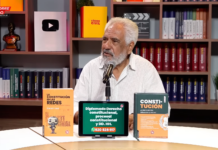

![A pesar de que no le corresponde a la Sala Penal de la Corte Suprema notificar el auto que concedió el recurso de casación, sí le es exigible verificar que ello se haya realizado, pues existe un especial deber de protección del derecho de defensa [Exp. 03341-2024-PHC/TC, f. j. 5]](https://img.lpderecho.pe/wp-content/uploads/2024/03/tribunal-constitucional-4-LPDerecho-218x150.jpg)
![El trabajador que solicita la nulidad del despido no se encuentra liberado de su carga probatoria, sino que tiene la obligación de aportar indicios razonables del despido [Casación Laboral 18431-2023, Cajamarca]](https://img.lpderecho.pe/wp-content/uploads/2024/04/despido-vacaciones-desacanso-horas-libres-feriado-trabajador-formal-LPDerecho-218x150.jpg)
![Indecopi multa a BBVA con más de S/1.5 millones por realizar llamadas spam [Resolución Final 083-2025/CC3]](https://img.lpderecho.pe/wp-content/uploads/2024/03/banner-bbva-logo-LPDerecho-218x150.jpg)

![Ley Orgánica del Registro Nacional de Identificación y Estado Civil (Ley 26497) [actualizada 2025]](https://img.lpderecho.pe/wp-content/uploads/2025/05/Ley-organica-del-registro-nacional-de-identificacion-y-estado-civil1-LPDERECHO-218x150.jpg)









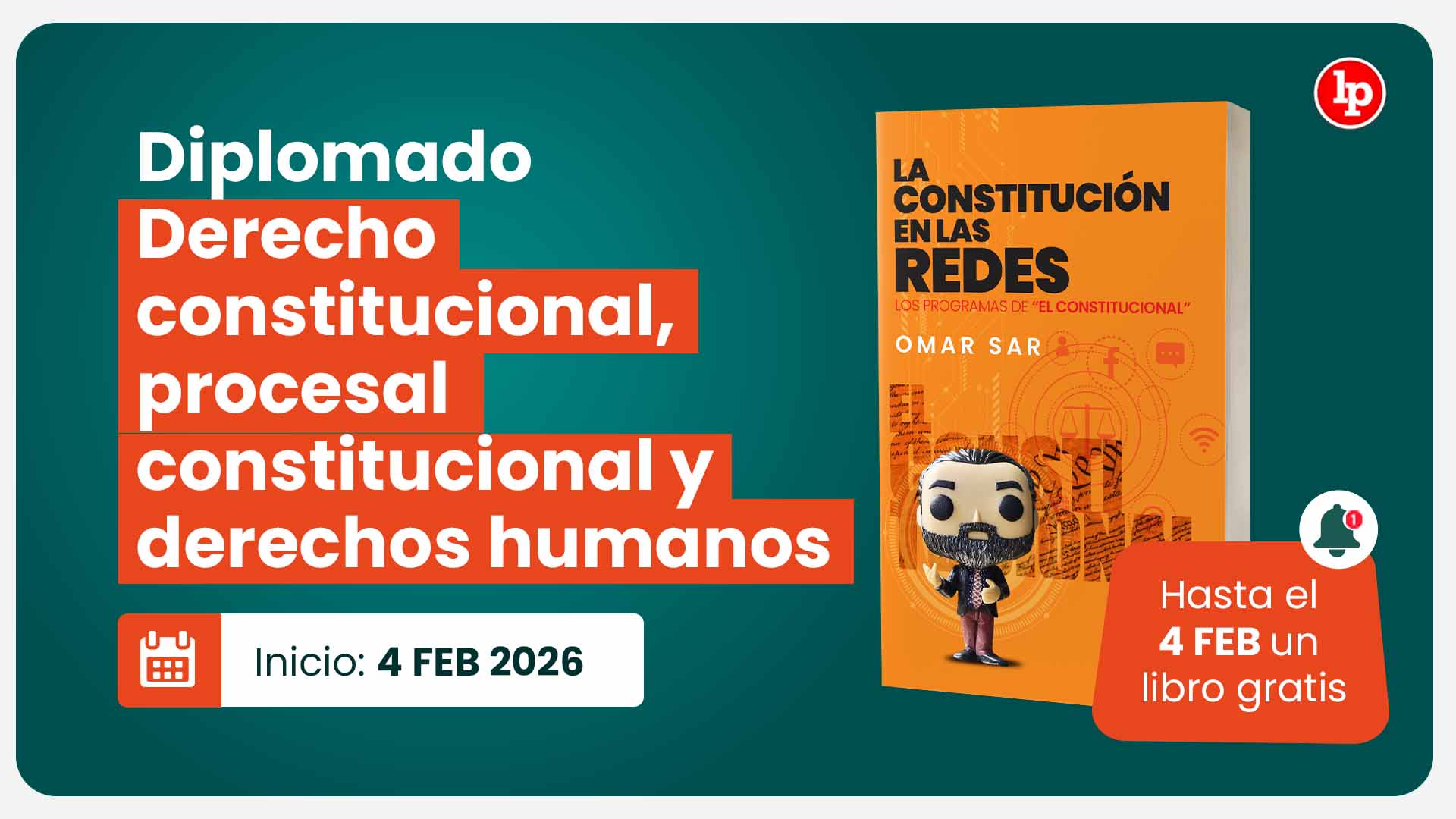
![[Balotario notarial] Registros notariales: registro de testamentos, de protestos, de bienes muebles, de asuntos no contenciosos](https://img.lpderecho.pe/wp-content/uploads/2025/09/REGISTROS-NOTARIALES-ESPECIALIZADOS-LPDERECHO-218x150.jpg)
![[Balotario notarial] Escritura pública, minuta y protocolización: concepto, estructura y formalidades esenciales](https://img.lpderecho.pe/wp-content/uploads/2025/10/Escritura-Publica-en-el-Peru-218x150.jpeg)



![La indemnización por daños y perjuicios ocasionados por un despido incausado, no puede equiparse a las remuneraciones que se dejaron de percibir por esta causa de despido [Casación 18589-2023, Del Santa]](https://img.lpderecho.pe/wp-content/uploads/2024/04/despido-desconcierto-trabajador-laboral-LPDerecho-218x150.jpg)
![¿Qué ocurre si una entidad no entrega la información solicitada por el portal de transparencia o no responde dentro del plazo legal? [Informe Técnico 002766-2025-Servir-GPGSC]](https://img.lpderecho.pe/wp-content/uploads/2025/03/SERVIR-LPDERECHO-218x150.jpg)
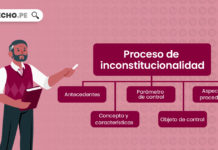




![Lineamientos sobre la designación y funciones del oficial de integridad electoral [Resolución 000021-2026-P/JNE]](https://img.lpderecho.pe/wp-content/uploads/2025/08/JNE-FACHADA-LPDERECHO-218x150.jpg)
![Ley de Delitos Informáticos (Ley 30096) [actualizada]](https://img.lpderecho.pe/wp-content/uploads/2024/08/ley-de-delitos-informaticos-ley-30096-actualizada-LPDERECHO-218x150.jpg)
![Código Civil peruano [actualizado 2026]](https://img.lpderecho.pe/wp-content/uploads/2024/05/VENTA-OFICIAL-CODIGO-CIVIL-2024-LPDERECHO-218x150.jpg)
![Código Procesal Penal peruano [actualizado 2026]](https://img.lpderecho.pe/wp-content/uploads/2024/02/VENTA-CODIGO-PENAL-BANNER-POST-TAPA-DURA-LPDERECHO-218x150.jpg)
![Código Penal peruano [actualizado 2026]](https://img.lpderecho.pe/wp-content/uploads/2024/05/VENTA-CODIGO-PENAL-LPDERECHO-218x150.jpg)
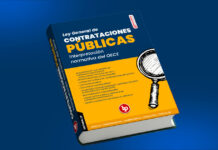

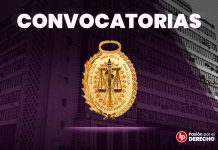

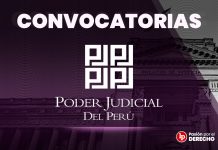
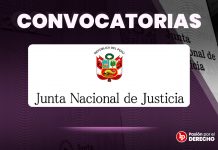


![[VÍDEO] ¿Quieres postular a la Fiscalía? Estas son las preguntas que hacen en las entrevistas](https://img.lpderecho.pe/wp-content/uploads/2021/10/postular-fiscalia-preguntas-entrevista-LP-218x150.jpg)


![EXP. N.° 0022-2009-PI/TC LIMA GONZALO TUANAMA TUANAMA Y MÁS DE 5000 CIUDADANOS SENTENCIA DEL TRIBUNAL CONSTITUCIONAL En Lima, a los 09 días del mes de junio de 2010, el Tribunal Constitucional en sesión de Pleno Jurisdiccional, con la asistencia de los magistrados Mesía Ramírez, Beaumont Callirgos, Vergara Gotelli, Landa Arroyo, Calle Hayen, Eto Cruz y Álvarez Miranda, pronuncia la siguiente sentencia con los fundamentos de voto de los magistrados Vergara Gotelli y Landa Arroyo, que se agregan. ASUNTO Demanda de Inconstitucionalidad interpuesta por Gonzalo Tuanama Tuanama, en representación de más de 5000 ciudadanos contra el Decreto Legislativo N.° 1089. DEMANDA Y CONTESTACIÓN a) Demanda contra el Decreto Legislativo N.° 1089, que regula el Régimen Temporal Extraordinario de Formalización y Titulación de Predios Rurales Con fecha 01 de julio de 2009, se interpone demanda de inconstitucionalidad contra el Decreto Legislativo N.° 1089, que regula el Régimen Temporal Extraordinario de Formalización y Titulación de Predios Rurales, publicada en el diario oficial El Peruano el 28 de junio de 2008. Los demandantes refieren que “'sin entrar al fondo del contenido de la norma”, ésta fue promulgada sin efectuar ninguna consulta previa e informada a los pueblos indígenas, tal como lo ordena el Convenio 169 de la Organización Internacional De Trabajo (OIT), afectándose con ello los derechos fundamentales de los pueblos Indígenas, como el derecho a la consulta previa y el derecho colectivo al territorio ancestral, establecidos en los artículos 6, 15, 17 del mencionado convenio. De igual forma, expresan que no se tomaron en cuenta los artículos 19, 30 y 32 de la Declaración de las Naciones Unidas sobre los Derechos de los Pueblos Indígenas (DNUDPI) aprobado por la Asamblea General de la Organización de Naciones Unidas. Alegan que con dicha norma se afectan otros derechos establecidos en el Convenio N.° 169, como el derecho sobre las tierras de los pueblos indígenas (artículos 13 al 19), en el considerando que no se tomaron en cuenta medida que garanticen la protección de sus derechos de propiedad y posesión. Refieren que se afecta también el derecho a la libre determinación de las comunidades nativas, previsto en el artículo 17 del Convenio, que declara el respeto de sus formas tradicionales de transmisión de sus territorios. Por último, alegan que se estaría vulnerando lo previsto en el artículo 19 del Convenio en cuanto se afecta el derecho al desarrollo de políticas agrarias adecuadas para los pueblos indígenas. [Continúa...] Descargue la resolución aquí](https://img.lpderecho.pe/wp-content/uploads/2023/01/Logo-LP-con-fondo-guinda-LPDERECHO-1068x561.png)

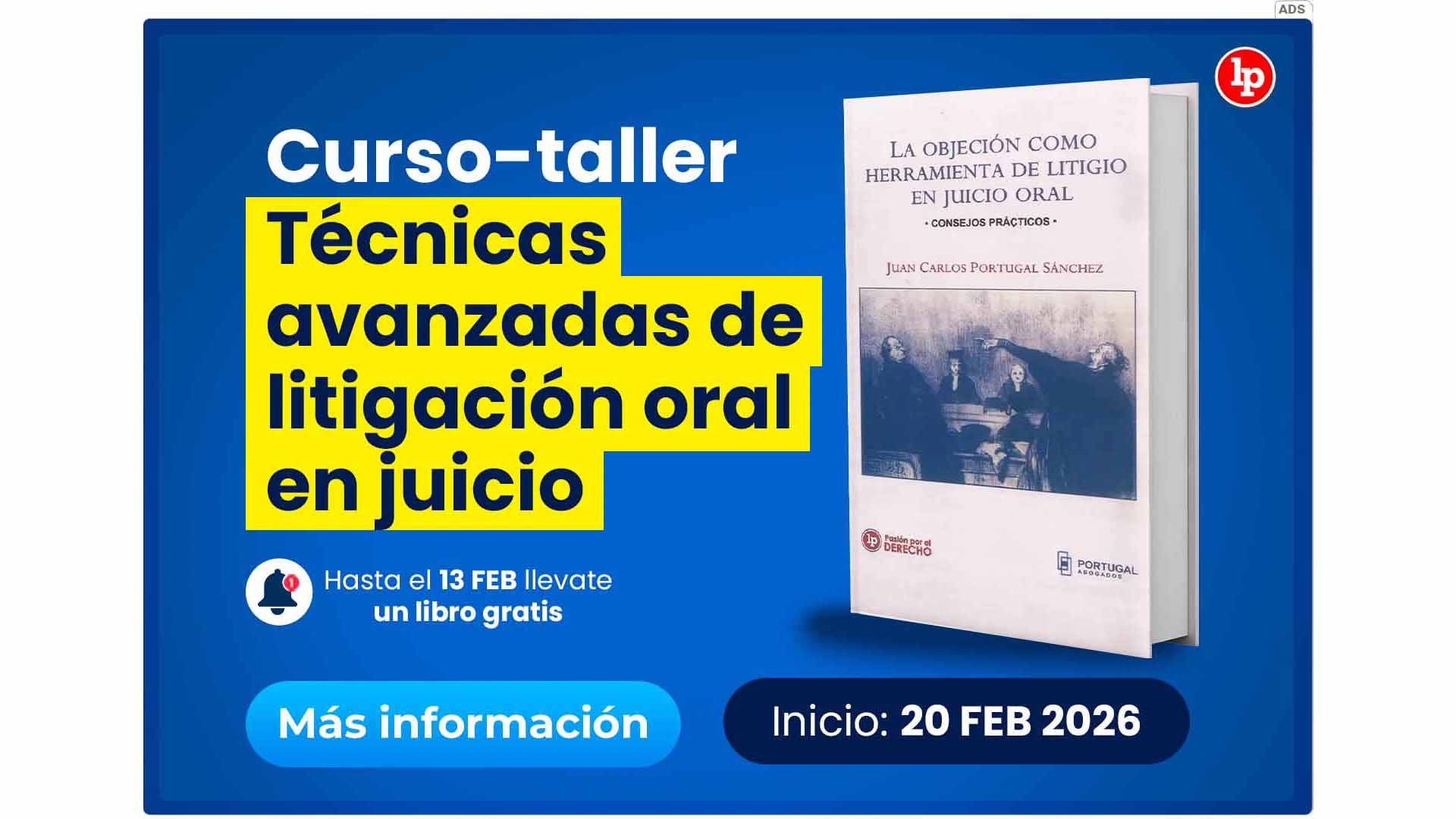
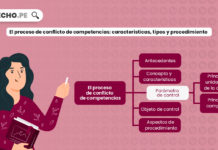
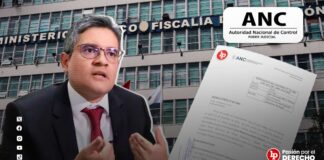


![Código Penal peruano [actualizado 2026]](https://img.lpderecho.pe/wp-content/uploads/2024/05/VENTA-CODIGO-PENAL-LPDERECHO-100x70.jpg)


![[Balotario notarial] Registros notariales: registro de testamentos, de protestos, de bienes muebles, de asuntos no contenciosos](https://img.lpderecho.pe/wp-content/uploads/2025/09/REGISTROS-NOTARIALES-ESPECIALIZADOS-LPDERECHO-100x70.jpg)
![[Balotario notarial] Escritura pública, minuta y protocolización: concepto, estructura y formalidades esenciales](https://img.lpderecho.pe/wp-content/uploads/2025/10/Escritura-Publica-en-el-Peru-100x70.jpeg)
![La falta de notificación al imputado del auto que concede el recurso de casación planteado por el fiscal lesiona su derecho de defensa [Exp. 03341-2024-PHC/TC, f. j. 8] TC usura servicios financieros](https://img.lpderecho.pe/wp-content/uploads/2024/03/tribunal-constitucional-fachada-tc-LPDerecho-100x70.jpg)
![A pesar de que no le corresponde a la Sala Penal de la Corte Suprema notificar el auto que concedió el recurso de casación, sí le es exigible verificar que ello se haya realizado, pues existe un especial deber de protección del derecho de defensa [Exp. 03341-2024-PHC/TC, f. j. 5]](https://img.lpderecho.pe/wp-content/uploads/2024/03/tribunal-constitucional-4-LPDerecho-100x70.jpg)






![Corte IDH: El derecho a conocer el paradero de víctimas de desaparición forzada es componente esencial del derecho a la verdad [Vásquez Durand y otros vs. Ecuador, ff. jj. 165-167]](https://img.lpderecho.pe/wp-content/uploads/2023/01/Logo-LP-con-fondo-guinda-LPDERECHO-324x160.png)